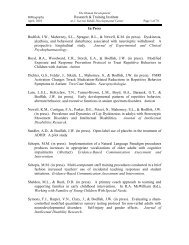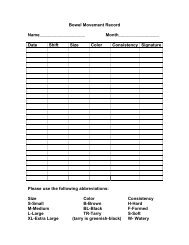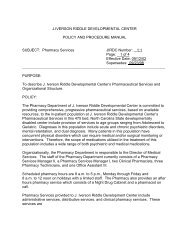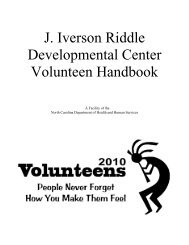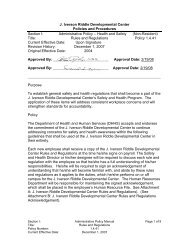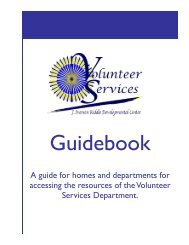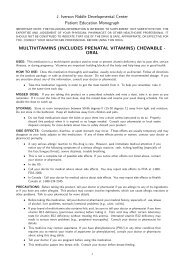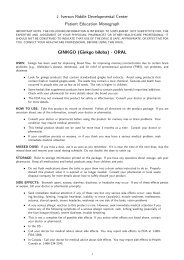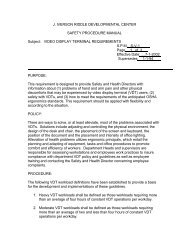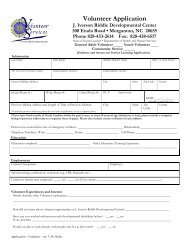INJECTION - JIRDC Home
INJECTION - JIRDC Home
INJECTION - JIRDC Home
Create successful ePaper yourself
Turn your PDF publications into a flip-book with our unique Google optimized e-Paper software.
J. Iverson Riddle Developmental Center<br />
Patient Education Monograph<br />
IMPORTANT NOTE: THE FOLLOWING INFORMATION IS INTENDED TO SUPPLEMENT, NOT SUBSTITUTE FOR, THE<br />
EXPERTISE AND JUDGEMENT OF YOUR PHYSICIAN, PHARMACIST OR OTHER HEALTHCARE PROFESSIONAL. IT<br />
SHOULD NOT BE CONSTRUED TO INDICATE THAT USE OF THE DRUG IS SAFE, APPROPRIATE, OR EFFECTIVE FOR<br />
YOU. CONSULT YOUR HEALTHCARE PROFESSIONAL BEFORE USING THIS DRUG.<br />
AMIKACIN - <strong>INJECTION</strong><br />
USES: This medication is used to prevent or treat a wide variety of bacterial infections. Amikacin belongs to a class<br />
of drugs known as aminoglycoside antibiotics. It works by stopping the growth of bacteria.<br />
HOW TO USE: This medication is given by injection into a vein or muscle as directed by your doctor. It is usually<br />
given every 8 hours or as directed by your doctor. The dosage is based on your medical condition, weight, and response<br />
to treatment. Laboratory tests (such as kidney function, levels of drug in the blood) may be performed to help find the<br />
best dose for your condition.<br />
• If you are giving this medication to yourself at home, learn all preparation and usage instructions from<br />
your health care professional. Before using, check this product visually for particles or discoloration. If<br />
either is present, do not use the liquid. Learn how to store and discard medical supplies safely.<br />
• Antibiotics work best when the amount of medicine in your body is kept at a constant level. Therefore,<br />
use this drug at evenly spaced intervals. To help you remember, use it at the same time(s) each day.<br />
• Continue to use this medication until the full prescribed amount is finished, even if symptoms disappear<br />
after a few days. Stopping the medication too early may allow bacteria to continue to grow, which may<br />
result in a return of the infection.<br />
• Tell your doctor if your condition persists or worsens.<br />
MISSED DOSE: For the best possible benefit, it is important to receive each scheduled dose of this medication as<br />
directed. If you miss a dose, contact your doctor or pharmacist immediately to establish a new dosing schedule. Do not<br />
double the dose to catch up.<br />
STORAGE: Consult the product instructions and your pharmacist for storage details. Keep all medications away from<br />
children and pets.<br />
• Do not flush medications down the toilet or pour them into a drain unless instructed to do so. Properly<br />
discard this product when it is expired or no longer needed. Consult your pharmacist or local waste<br />
disposal company.<br />
SIDE EFFECTS: See also Warning section.<br />
• Nausea, vomiting, stomach upset, or loss of appetite may occur. Pain/irritation/redness at the injection<br />
site may infrequently occur. If any of these effects persist or worsen, tell your doctor or pharmacist<br />
promptly.<br />
• Remember that your doctor has prescribed this medication because he or she has judged that the benefit<br />
to you is greater than the risk of side effects. Many people using this medication do not have serious<br />
side effects.<br />
• Tell your doctor right away if you have any serious side effects, including: numbness/tingling, muscle<br />
twitching or weakness, seizure.<br />
• This medication may rarely cause a severe intestinal condition (Clostridium difficile-associated diarrhea)<br />
due to a type of resistant bacteria. This condition may occur during treatment or weeks to months after<br />
treatment has stopped. Do not use anti-diarrhea products or narcotic pain medications if you have any<br />
of the following symptoms because these products may make them worse. Tell your doctor immediately<br />
if you develop: persistent diarrhea, abdominal or stomach pain/cramping, blood/mucus in your stool.<br />
• Use of this medication for prolonged or repeated periods may result in oral thrush or a new yeast infection.<br />
Contact your doctor if you notice white patches in your mouth, a change in vaginal discharge, or other<br />
new symptoms.<br />
• A very serious allergic reaction to this drug is rare. However, seek immediate medical attention if you<br />
notice any of the following symptoms of a serious allergic reaction: rash, itching/swelling (especially of<br />
the face/tongue/throat), severe dizziness, trouble breathing.<br />
1
• This is not a complete list of possible side effects. If you notice other effects not listed above, contact<br />
your doctor or pharmacist.<br />
• In the US -<br />
• Call your doctor for medical advice about side effects. You may report side effects to FDA at 1-800-<br />
FDA-1088.<br />
• In Canada - Call your doctor for medical advice about side effects. You may report side effects to Health<br />
Canada at 1-866-234-2345.<br />
PRECAUTIONS: Before using amikacin, tell your doctor or pharmacist if you are allergic to it; or to other aminoglycoside<br />
antibiotics (such as gentamicin, tobramycin); or if you have any other allergies. This product may contain<br />
inactive ingredients (such as sulfites), which can cause allergic reactions or other problems. Talk to your pharmacist for<br />
more details.<br />
• Before using this medication, tell your doctor or pharmacist your medical history, especially of: cystic<br />
fibrosis, hearing problems (including deafness, decreased hearing), kidney problems, low blood minerals<br />
(including potassium, magnesium, calcium), myasthenia gravis, Parkinson’s disease.<br />
• Amikacin may cause live bacterial vaccines (such as typhoid vaccine) not to work as well. Therefore,<br />
do not have any immunizations/vaccinations while using this medication without the consent of your<br />
doctor.<br />
• Before having surgery, tell your doctor or dentist about all the products you use (including prescription<br />
drugs, nonprescription drugs, and herbal products).<br />
• Older adults may be more sensitive to the effects of this drug, especially kidney damage.<br />
• This medication is not recommended for use during pregnancy. Although there have been reports of<br />
harm in babies born to women using similar drugs, there have not been reports of harm in babies born<br />
to women using amikacin. Discuss the risks and benefits with your doctor.<br />
• This drug passes into breast milk in small amounts. However, many doctors consider breastfeeding safe<br />
while using this medication. Consult your doctor before breastfeeding.<br />
DRUG INTERACTIONS: See also Warning section.<br />
• Drug interactions may change how your medications work or increase your risk for serious side effects.<br />
This document does not contain all possible drug interactions. Keep a list of all the products you use<br />
(including prescription/nonprescription drugs and herbal products) and share it with your doctor and<br />
pharmacist. Do not start, stop, or change the dosage of any medicines without your doctor’s approval.<br />
• Other medications that may affect the kidneys or hearing may increase the risk of kidney damage<br />
or hearing loss if taken with amikacin. Some examples include: amphotericin B, cidofovir, cisplatin,<br />
polymyxin B, tobramycin, cephalosporins such as cephaloridine, nonsteroidal anti-inflammatory drugs<br />
(NSAIDs) such as ibuprofen, ”water pills”/diuretics such as furosemide, among others.<br />
• Although most antibiotics probably do not affect hormonal birth control such as pills, patch, or ring, some<br />
antibiotics may decrease their effectiveness. This could cause pregnancy. Examples include rifamycins<br />
such as rifampin or rifabutin. Be sure to ask your doctor or pharmacist if you should use additional<br />
reliable birth control methods while using this antibiotic.<br />
NOTES: Laboratory and/or medical tests (such as kidney function, amikacin blood levels) may be performed periodically<br />
to monitor your progress or check for side effects. Consult your doctor for more details.<br />
OVERDOSE: If overdose is suspected, contact a poison control center or emergency room immediately. US residents<br />
can call the US National Poison Hotline at 1-800-222-1222. Canada residents can call a provincial poison control<br />
center.<br />
WARNING: This medication can cause serious kidney problems and nerve damage, resulting in permanent hearing<br />
loss (including deafness or decreased hearing) and balance problems. The risk is increased if you are older, already have<br />
kidney disease, or if you have a severe loss of body water (dehydration). Your risk is also increased if you receive high<br />
doses, or with longer use of this medication.<br />
• Tell your doctor immediately if you notice ringing/roaring sounds in the ears, hearing loss, dizziness, or<br />
an unusual decrease in the amount of your urine.<br />
• Careful monitoring by your doctor will reduce the risk of these side effects. Monitoring may include<br />
hearing, kidney, urine, and drug blood level tests.<br />
• Avoid other medications that may increase your risk for these serious side effects if taken together with<br />
amikacin. See also Drug Interactions section.<br />
2



